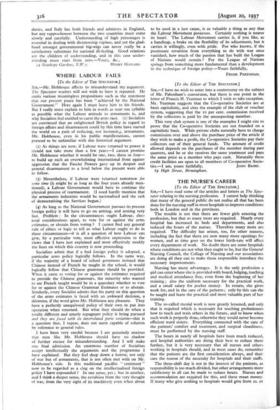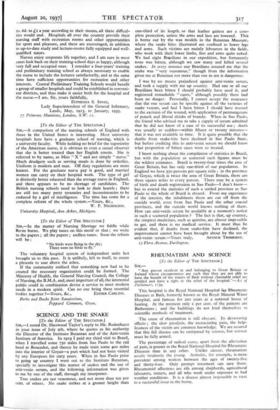THE NURSE'S CAREER
[To the Editor of THE SPECTATOR.] Strt,—I have read some of the articles and letters in The Spec- tator relating to the nursing profession. I cannot help thinking that many of the general public do not realise all that has been done for the nursing staff in most hospitals to improve conditions both in London and in the provinces.
The trouble is not that there are fewer girls entering the profession, but that so many more are required. Nearly every hospital has increased its beds and departments, and also reduced the hours of the nurses. Therefore many more ate required. The difficulty has arisen, too, for other reasons, including the fact that there are now many more openings for women, and as time goes on the lower birth-rate will affect every department of work. No doubt there are some hospitals where conditions are not what they ought to be, but the General Nursing Council, the College of Nursing and our associations are doing all they can to make those responsible introduce the necessary improvements.
Nursing has many advantages. It is the only profession a girl can enter where she is provided with board, lodging, teething and medical attendance free, even from the beginning of her training ; also the uniform necessary for the practical work, and a small salary for pocket money. In return, she gives work for, and in the care of the patients; only by this can 'she be taught and learn the practical and most valuable part of her training.
The so-called menial work is now greatly lessened, and only that is required which is necessary for teaching probationers how to teach and train others in the future, and to know when such work is properly done, otherwise they would never become efficient ward sisters. Everything connected with the care of the patients' comfort and treatment, and surgical cleanliness, must be performed by the nursing staff.
The hours in nearly all hospitals have been much reduced, and hospital authorities are doing their best to reduce them further, but it is very necessary that all nurses and others Working in hospitals should, and in most cases do, remember that the patients are the first consideration always, and their care the reason of the necessity for hospitals and their staffs.
The three-shift day is not in the interest of the patients, as responsibility is too much divided, but other arrangements more satisfactory to all can be made to reduce hours. Nurses and accommodation are required for this, and these mean money. If many who give nothing to hospitals would give from is. or 2s. 6d. to LI a year according to their means, all iheie difficul- ties would end. Hospitals all over the country provide their nursing staff with recreation rooms and other opportunities for sport and pleasure, and these are encouraged, in addition to up-to-date study and lecture-rooms fully equipped and well- qualified tutors.
Nurses enjoy corporate life together, and I am sure in most cases look back on their training-school days as happy, although very full and occupied ones.. I consider a four yearn' training and preliminary training school as always necessary to enable the nurse to include the lectures satisfactorily, and at the same time have sufficient opportunities for recreation and other interests. Central Preliminary Training Schools would benefit a group of smaller hospitals and could be established in conveni- ent districts, and thus, make it easier both for the hospital and the nurse.—I am, Sir, yours faithfully, EUPHEMIA S. INNES,
Lady Superintendent of the General Infirmary, Leeds, May, 1913, to January, 1935.
77 Primrose Mansions, London, S.W. Tr.
[To the Editor of THE SPECTATOR.] SIR,—A comparison of the nursing schools of England with those in the United States is interesting. Most university hospitals here have a graduate school of nursing, which is a university faculty. While holding no brief for the superiority of the American nurse, it is obvious to even a casual observer that she is better treated than her English cousin. She is referred to by name, as Miss X " and not simply " nurse." Much drudgery such as serving meals is done by orderlies. Uniform is modern and neat. Off duty regulations are more lenient. For the graduate nurse pay is good, and married women can carry on their hospital work. The type of girl is distinctly better educated than the average nurse in England, and there appears to be no shortage of candidates. The British nursing schools need to look to their laurels ; there are still too many petty tyrannies and inconsistencies to be endured by a girl of intelligence. The time has come for a complete reform of the whole system.—Yours, &c., W. F. NicHoLsoN.
University Hospital, Ann Arbor, Michigan.







































 Previous page
Previous page